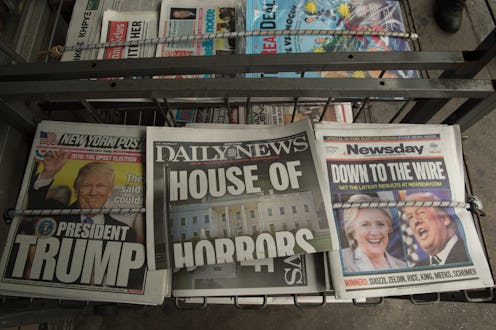News
6 Explanations For Donald Trump's Win
It is the morning after Donald Trump's 2016 presidential win, a win that is still shocking to many and essentially unprecedented in the history of American politics. With pundits, election experts and polls getting the result dead wrong in the run-up to the actual vote on Nov. 8, it's worth taking time thinking about how it happened. What changed in America between the version that most people thought it was and the version that showed up to vote in swing states? What was wrong with our thinking that allowed all of the analysts, working from fine data, excellent education, and a thorough understanding of history, to be so wrong?
Below are six of my favorite pieces in the wake of the jaw-dropping, almost-entirely unpredicted results that allow us to better understand what happened on Tuesday. They are analyses of data and polling, actions by the two campaigns, and a greater understanding of the mood in America, the way the race was covered, and how people reacted. As so many Americans grapple with how a Trump win could occur in the larger sense — i.e. how could the country elect a man who spewed so much hateful, anti-immigrant, anti-women rhetoric — it may actually help to consider the nuts and bolts of how Trump emerged the electoral winner.
1. "Why Trump Won: Working Class Whites" - The New York Times
Nate Cohn, the political data-cruncher extraordinaire of the New York Times gave a straightforward but thorough analysis of who voted for Trump and who didn't vote for Clinton. It's a little technical, but Cohn makes the data easy to understand and digest.
2. "Inside The Loss Clinton Saw Coming" - Politico
As a writer for the ultimate publication for political insiders, Politico's Edward-Isaac Dovere analyzed the inside game at the Clinton campaign, confident to the point of foolhardiness as the election approached, more obsessed with nuts-and-bolts campaigning than a strong overarching message, and very much a bubble unaware of the approaching burst.
3. "President-Elect Trump Did Not Create the Movement, It Created Him" - National Review
Andrew McCarthy, a conservative who felt Washington needed radical change but felt Trump wasn't the right vessel, looked at the forces that sent Trump to the top and how powerful they truly were. In his view, Trump has likely still not appreciated how powerful his supporters' movement is and coming American politics will be affected by it.
4. "Democrats, Trump, and the Ongoing, Dangerous Refusal to Learn the Lesson of Brexit" - The Intercept
Glenn Greenwald, the Pulitzer-awarded hero of the anti-establishment left, fit Trump's victory in among the larger scale movements towards populism throughout the world, and placed the blame squarely on elites who failed to realize the damage that has been inflicted upon those left behind. Greenwald, a longtime Clinton critic, showed vindication, as he sees her lack of connection to those she hoped to lead evident.
5. "White Won" - Slate
As an African American commentator, Jamelle Bouie saw the election of Trump as a force of white fear and anger. He highlighted all the times Trump played into the hopes of white nationalists and energized their support, comparing it to the history of white backlash to Reconstruction and other moments of black progress. I hope he's wrong.
6. "A ‘Dewey Defeats Truman’ Lesson for the Digital Age" - The New York Times
The New York Times' media columnist, Jim Rutenberg, looked at 2016 from the perspective of how horribly journalism and media got it wrong. In his view, the experts couldn't fathom a Trump victory, and therefore failed to plan for it. It damaged the country, but just as emphatically, the country damaged the media right back.
